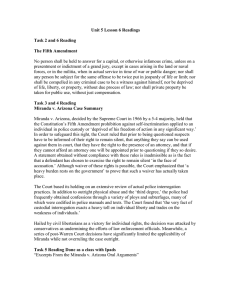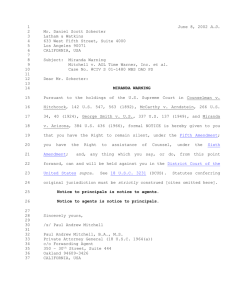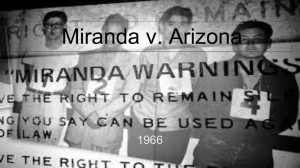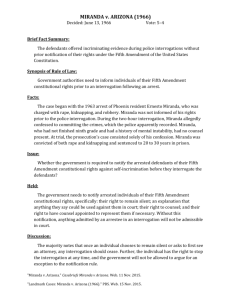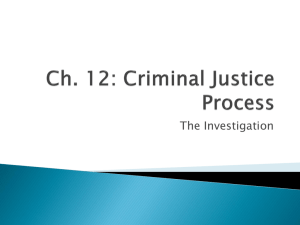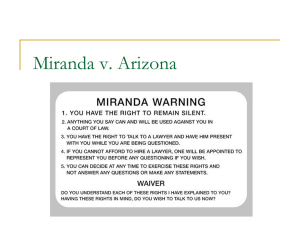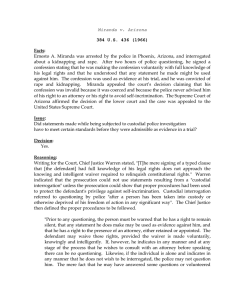Miranda Warnings ARE
advertisement
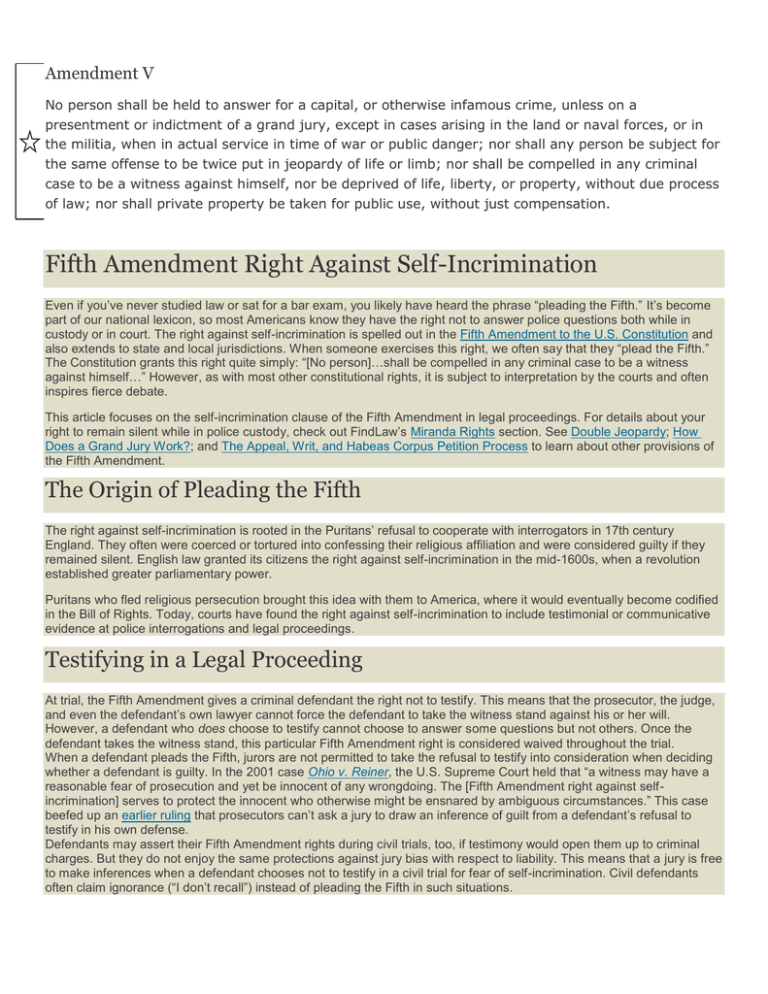
Amendment V No person shall be held to answer for a capital, or otherwise infamous crime, unless on a presentment or indictment of a grand jury, except in cases arising in the land or naval forces, or in the militia, when in actual service in time of war or public danger; nor shall any person be subject for the same offense to be twice put in jeopardy of life or limb; nor shall be compelled in any criminal case to be a witness against himself, nor be deprived of life, liberty, or property, without due process of law; nor shall private property be taken for public use, without just compensation. Fifth Amendment Right Against Self-Incrimination Even if you’ve never studied law or sat for a bar exam, you likely have heard the phrase “pleading the Fifth.” It’s become part of our national lexicon, so most Americans know they have the right not to answer police questions both while in custody or in court. The right against self-incrimination is spelled out in the Fifth Amendment to the U.S. Constitution and also extends to state and local jurisdictions. When someone exercises this right, we often say that they “plead the Fifth.” The Constitution grants this right quite simply: “[No person]…shall be compelled in any criminal case to be a witness against himself…” However, as with most other constitutional rights, it is subject to interpretation by the courts and often inspires fierce debate. This article focuses on the self-incrimination clause of the Fifth Amendment in legal proceedings. For details about your right to remain silent while in police custody, check out FindLaw’s Miranda Rights section. See Double Jeopardy; How Does a Grand Jury Work?; and The Appeal, Writ, and Habeas Corpus Petition Process to learn about other provisions of the Fifth Amendment. The Origin of Pleading the Fifth The right against self-incrimination is rooted in the Puritans’ refusal to cooperate with interrogators in 17th century England. They often were coerced or tortured into confessing their religious affiliation and were considered guilty if they remained silent. English law granted its citizens the right against self-incrimination in the mid-1600s, when a revolution established greater parliamentary power. Puritans who fled religious persecution brought this idea with them to America, where it would eventually become codified in the Bill of Rights. Today, courts have found the right against self-incrimination to include testimonial or communicative evidence at police interrogations and legal proceedings. Testifying in a Legal Proceeding At trial, the Fifth Amendment gives a criminal defendant the right not to testify. This means that the prosecutor, the judge, and even the defendant’s own lawyer cannot force the defendant to take the witness stand against his or her will. However, a defendant who does choose to testify cannot choose to answer some questions but not others. Once the defendant takes the witness stand, this particular Fifth Amendment right is considered waived throughout the trial. When a defendant pleads the Fifth, jurors are not permitted to take the refusal to testify into consideration when deciding whether a defendant is guilty. In the 2001 case Ohio v. Reiner, the U.S. Supreme Court held that “a witness may have a reasonable fear of prosecution and yet be innocent of any wrongdoing. The [Fifth Amendment right against selfincrimination] serves to protect the innocent who otherwise might be ensnared by ambiguous circumstances.” This case beefed up an earlier ruling that prosecutors can’t ask a jury to draw an inference of guilt from a defendant’s refusal to testify in his own defense. Defendants may assert their Fifth Amendment rights during civil trials, too, if testimony would open them up to criminal charges. But they do not enjoy the same protections against jury bias with respect to liability. This means that a jury is free to make inferences when a defendant chooses not to testify in a civil trial for fear of self-incrimination. Civil defendants often claim ignorance (“I don’t recall”) instead of pleading the Fifth in such situations. Can Any Witness Plead the Fifth? At a criminal trial, it is not only the defendant who enjoys the Fifth Amendment right not to testify. Witnesses who are called to the witness stand can refuse to answer certain questions if answering would implicate them in any type of criminal activity (not limited to the case being tried). Witnesses (as well as defendants) in organized crime trials often plead the Fifth, for instance. But unlike defendants, witnesses who assert this right may do so selectively and do not waive their rights the moment they begin answering questions. Also, unlike defendants, witnesses may be forced by law to testify (typically by subpoena). Does the Fifth Amendment Apply to Fingerprints and Blood Tests? The Fifth Amendment right against self-incrimination does not extend to the collection of DNA or fingerprints in connection with a criminal case. The Supreme Court has held the privilege extends only to communicative evidence, and DNA and fingerprint evidence is considered non-testimonial. If you have additional questions about your Fifth Amendment right against self-incrimination, or need representation, consider calling a criminal defense attorney. - See more at: http://criminal.findlaw.com/criminal-rights/fifth-amendment-right-against-selfincrimination.html#sthash.EwwJE2aw.dpuf Miranda v. Arizona: A Primer The Miranda case dealt with the admissibility of statements made during custodial interrogation under the Fifth Amendment's privilege against compelled self-incrimination. Under Miranda, to help dispel the “inherently coercive” atmosphere of custodial interrogation, a person in custody must be told of the right to remain silent and warned that any statements can and will be used against the individual in court. Recognizing that even this “oncestated warning” will not by itself fully protect the average citizen from the coercive pressures of custodial interrogation, the Supreme Court also requires that persons in custody be given the right to consult with a lawyer before and during interrogation and that this right to counsel be included in the warnings given by the police. Unless the person being interrogated receives the required warnings and waives their right to silence and counsel, no statements they make may be admitted in court. When the Miranda rules are not followed, statements made by a suspect are not allowed as evidence for three reasons: (1) to avoid the risk that statements were compelled in violation of the defendant's Fifth Amendment rights; (2) to encourage officers to comply with the Miranda rules, thereby lessening the future likelihood of compelled self-incrimination; and (3) to discourage the kinds of unsavory police practices that tended to compel confessions from suspects. The Constitution does not explicitly require such warnings or the exclusion of statements given in the absence of such warnings and waiver. However, a majority of the Court viewed custodial interrogations as inherently coercive and feared that without warnings and the right to counsel, enforced by an exclusionary rule (the rule that excludes the evidence from being used at trial under most circumstances), the Fifth Amendment would become meaningless. Textualists, those advocating a strictly text-based interpretation of the Constitution, criticize this methodology as judicial creation of rights. The Four Miranda Warnings: If Miranda applies, a suspect must be given warnings before being questioned which indicate: 1. He has the right to remain silent, 2. Anything he says can and will be used against him in a court of law, 3. He has the right to the presence of an attorney, and 4. If he cannot afford an attorney one will be appointed for him prior to any questioning if he so desires. When Does Miranda Apply? Miranda does NOT apply unless a person is in custody and subjected to interrogation by a law enforcement officer. 1. Custody Definitions: Custody requires a significant deprivation of liberty. A person is in custody only if they are subjected to either formal arrest or its “functional equivalent.” o Formal arrest—occurs when a person is explicitly told they are being placed under arrest or is booked at the stationhouse. o Functional equivalent—occurs when a suspect's freedom of action is significantly curtailed to a degree associated with a formal arrest. Consider a reasonable person under the same conditions of the suspect: Would a reasonable person under the same circumstances believe they were free to leave? (In other words: what would an average or typical member of the community think under the same circumstances?) The Court is not trying to figure out what this particular suspect thought. 2. Interrogation by a law enforcement officer Even if the person is in custody, Miranda only applies if the suspect was interrogated by known law enforcement officers. Definitions: Interrogation- includes any direct questioning by officers about a crime under investigation and more subtle statements or conduct that are the "functional equivalent" of direct questioning The “functional equivalent” of direct questioning is any speech or actions by an officer that they should have known were reasonably likely to elicit an incriminating response. Determining the functional equivalent: Reasonably likely: o Courts will deem it "interrogation" only if officers knew or should have known an incriminating response was reasonably likely. (Note: What the officer should have known is judged from the perspective of a reasonable officer in the same situation.) Officer's intent: o Courts will probably consider it to be interrogation if the officer actually intended that their words or conduct would elicit an incriminating response. Officer's knowledge of the suspect: o Courts will usually treat it as interrogation if an officer was aware of —and exploited—a suspect's unusual weakness or fear. Link between the police conduct and crime: o Courts will be more apt to deem a police tactic “interrogation” if there was a direct link between the statement or conduct and the crime under investigation. Accusations: o Accusing a suspect of committing a crime is virtually always interrogation because an incriminating response is reasonably foreseeable. Spontaneous, volunteered statements: Spontaneous statements volunteered by the suspect without questioning are NOT considered the product of interrogation even if the suspect was in custody at the time. 3. The Public Safety Exception to Miranda The U.S. Supreme Court has ruled that Miranda warnings are unnecessary prior to questioning that is “reasonably prompted by a concern for the public safety” Consider whether a reasonable officer in the same position would conclude that there is a significant threat to the public safety Example: interrogation that occurs as police try to locate a bomb they believe is set to go off Miranda Checklist Should the suspect have been read their Miranda warnings? Was the person in custody? Was it a formal arrest? NO YES Was it the functional equivalent of arrest? i.e., a reasonable person would NOT have felt free to leave YES Was the person directly questioned by a law enforce‐ ment officer? NO Miranda Warnings NOT necessary. NO YES Did the officer say or do anything that he intended to, knew, or should have known was reasonably likely to elicit an incriminating response? YES Would a reasonable officer in the same position would conclude that there is a significant threat to the public safety and needed to ques‐ tion the suspect immediately? YES Miranda Warnings ARE necessary. © Street Law, Inc. 2010 1 IN NB: ANSWER AND EXPLAIN REASONING Should the defendant have received Miranda warnings before the police interrogation began? 1. Alvarado is a 17 year old high school student. A police detective contacted his mother who agreed to bring him to the police station for questioning about a recent crime. When Alvarado arrived with his parents, the detective denied the parents’ request to remain with their son during the interview. While the parents waited in the lobby, Alvarado was questioned by police. He was not advised of his Miranda rights. During the two hour session, the detective twice asked Alvarado if he wanted to take a break. Alvarado admitted to his role in a murder and robbery that police were investigating. At the end of the interview Alvarado went home. His confession was offered as evidence against him at trial. 2. After receiving the description of an alleged assailant, a police officer entered a supermarket, and spotted Quarles, a man fitting the description. The officer ordered Quarles to stop. Quarles complied and was then frisked by the officer. Upon detecting an empty shoulder holster, the officer asked Quarles where his gun was. Quarles responded. The officer then formally arrested Quarles and read him his Miranda rights. Both the gun and Quarles initial response were offered as evidence against him at trial. 3. After a vehicle equipped with a faulty bomb was left in a major metropolitan area and reported to authorities, police pieced together incriminating evidence including the vehicle’s identification number and telephone records. All evidence pointed toward one suspect, Shahzad, an American citizen. Police eventually located Shahzad on an international flight ready to depart and took him into custody. Shahzad was interrogated about the failed bombing and its connection to terrorist plots and he admitted responsibility and provided other intelligence to officials. Then, after being transported to another location, Shahzad was read his Miranda rights. He waived his rights, however, and continued talking to the police. All of the incriminating information Shahzad revealed to police will be used against him at trial. 4. McCarty, a motorist, was stopped by a highway patrol officer after McCarty’s vehicle was seen weaving in and out of its lane on the highway. The officer then asked McCarty to exit his vehicle. McCarty had difficulty standing and was given a roadside sobriety test. After failing the test, the officer asked McCarty if he had consumed any intoxicants. McCarty responded he had two beers and smoked marijuana shortly before driving. McCarty was then arrested and taken to a county jail, where McCarty was given a blood alcohol test and police questioning resumed. At no point was McCarty read his Miranda rights. McCarty’s pre- and post-arrest statements were admitted as evidence against him at trial.
